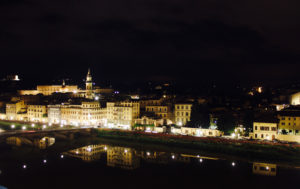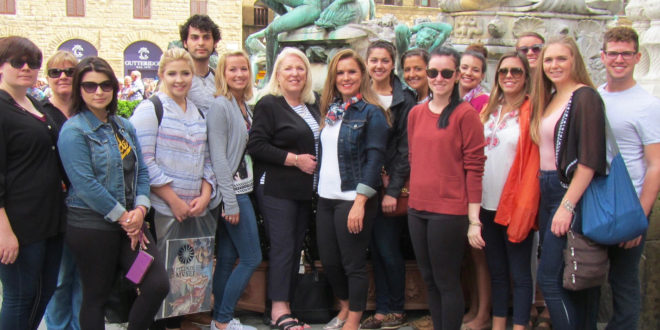One of the most rewarding experiences professors collect is to watch students expand their horizons and growth. Through the Experiential Learning program several students participated in life changing adventures during recently completed study travels abroad.
“It’s one of the joys of being a professor because you see their lives changing in front of you,’’ Dr. Annmarie Kent-Willette of the Communications Department said. “It’s magic. To be able to bring to life these ideas you talk about in the classroom changes them. The students come to learn that we share so much more in common (with other parts of the world) than differences.’’
Dr. Kent-Willette and colleague Dr. Carole Barnett, Humanities professor, led a two-week sojourn through Italy early this summer, one of four such trips for credit through EL.
The trips aren’t merely an opportunity for students to blow off steam, eat, drink and be merry; they are well planned and executed learning experiences that sometimes offer surprises such as the night in Rome when students witnessed history when the city elected its first female mayor.
“My students were there primarily for the art, architecture, literature, basically things I teach in my Medieval Renaissance class,’’ Barnett said. “They were doing field notes, research papers and taking photos as well. Her students were video graphing and a lot of their work was after they got back.’’
In fact, Kent-Willette said, with thousands of photos and hundreds of hours of video, several students asked to continue to work on more advanced projects this semester.
Both professors believe in extensive preparation before undertaking the international studies.
“Carole and I offer our courses in tandem so we take an interdisciplinary approach,’’ Kent-Willette said. “I love it because students do a really deep dive. We don’t just go to Pompeii. By the time we get there the students have studied about Pompeii, they’ve put together presentations, participated in discussion boards so it’s so much more meaningful than a tour of Pompeii. We have that with Carole’s class. With my class, they are viewing it with digital video equipment and now they are being asked to write blogs about it and are interviewing one another about the experience. It becomes multi-layered experience and offers greater understanding for the student.’’
While the focus of each trip is related to in-class related material, preparation clearly includes a study of the culture of the country being visited, how to dress, how to approach people, even the learning of common phrases before departure.
“We go above and beyond on our preparation for our students so they know and they take it very seriously,’’ Barnett said. “We view ourselves and our students as ambassadors abroad and we tell them that.’’
Senior Chloe Lyden, station manager for the Dolphin News Channel, was on the Italy trip and concurs with the professors.
“Having the opportunity to study abroad has allowed me exposure to new cultures and gave me a new appreciation for my education and being open to new experiences,’’ she said.
Later in the summer and about 2,000 miles north, Dr. Jeremy Stalker of the Marine Science Department and English professor Dr. Julie Brannon, were leading students through Iceland.
“The biggest thing I like them to get out of it is the world’s a lot bigger than they think and there are a lot of views and ways to live that are perfectly normal that aren’t theirs,’’ Stalker said. “That will help them whatever discipline they are in because it will lead into actual business opportunities. It will lead into new ideas, expand your horizons and expectations and what you can do in life. You learn about you.’’
Like those on the Italy trip, classroom related learning is combined with cultural learning.
“We had 12 freshmen and five junior and senior mentors,’’ Stalker said. “We toured a geothermal hot house for growing tomatoes and cucumbers. We teach them some literature, a little natural science and we talk about culture, traveling and how to deal with yourself in a foreign country. And, we meet every evening to talk about the day.’’
Stalker also headed a summer EL study abroad to the Bahamas with Dr. Lee Ann Clements (Associate Provost, Interim Dean, College of Arts and Sciences) where biology students applied what they have learned.
“For biology students it’s an application. It’s field work, it’s hot, there’s bugs, you’re staying in barracks from the 1940s, in barracks that probably have the same mattresses from the 40s, but you’re learning to do science in field.’’
A fourth EL summer trip had Davis College of Business students with Don Capener, Dean of DCOB, in Scotland.
No matter where the travels lead, the lessons learned go beyond the scope of JU or the city.
“The students are learning lessons that are much bigger than anything I’m going to teach in communications or that Carole is going to teach about humanities,’’ Kent-Willette said. “You may be the only person they meet from Florida. It’s more than Jacksonville University or Jacksonville in Florida. In many cases, you are going to be what they think of when they think of Americans.’’
– Jim Nasella
 Wave Magazine Online Jacksonville University News Hub
Wave Magazine Online Jacksonville University News Hub
